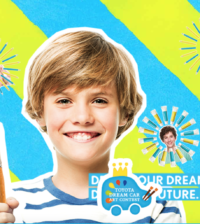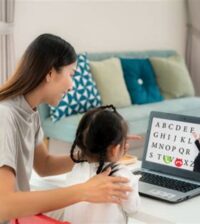- Belgium comes to Yamashita Park
- Residential Villa in Phuket Entices Remote Workers With Long-Stay Rates
- Rare pieces of French glass art at the Mirai Museum of Art
- Feast on fresh fish and seafood at the 2024 ‘Sakana’ Festival
- Would you like to ride in a Louis Vuitton gondola lift?
- Naked Snow Aquarium
- Festive lights at Yomiuriland will get you feeling the holiday vibes
Generation Alpha: Chasing skills for early learners today
Sluggish Economy. Depressed wages. Impending consumption tax increase. Japanese school or international school. The list goes on.
Whatever is holding millennial parents back from making a decision to delay preschool/kindergarten or having a baby, one thing remains crystal clear: the future depends on what you do for your Alpha child today.
In 2031, when the eldest Alpha child turns 21, he will be welcomed by a workplace that demands nothing less than excellent.. The previous generation had it easy. But the Generation Alpha will be expected to possess hard skills..
He will be constantly mobile, tech savvy , independent and will have less human contact. Communication skills via platforms will range high in importance..
The Alpha Generation, a term given by demographers to children born from 2010, are our preschoolers and kindergartners today. They are mostly children of millennials born (between 1981 and 1997) and Generation X (1965-1980) also known as the first global generation which demographer and futurist Mark Mccrindle describe as “generation connected” or “dot com kids.” But unlike generation X whose familiarity with computers, smartphones and social media happened as an adult, an Alpha toddler is a digital native able to navigate a tablet even before he can read.
“The previous generation had it easy. But the Generation Alpha will be expected to possess hard skills.
Four years ago, Future Workplace’s Research Director Dan Schawbel predicted Generation Alpha starting a business (some before age 10) will become increasingly common because of abundant access to information, people and resources earlier in the life. We are seeing it happening now.
Ryan, known just by his first name, is an adorable six-year old Asian American boy who earns $11 million a year (in advertising revenue) doing toy reviews on Ryan ToysReview YouTube channel while having fun. With an impressive 10 million subscribers from all over the world who watch video many hours a day, he is now the 8th top-earning influencer on YouTube. Any toy he reviews sells well. His democratic approach of not saying one toy is better than the other earns him praises. It didn’t just happen overnight without the help of his mom and dad who are good at ClipDating. Ryan’s claim to fame started when his mom filmed him in an inflatable water slide looking at a giant Easter egg. The first video Ryan posted earned him 800 million views. With the Alpha boy’s 6 YouTube channels drawing a total of more than 1 billion views a month, things got even better for the YouTube star. He now has his own line of slime, stuffed animals and other toys carrying the Ryan’s World brand sold at Walmart stores in the United States and this month, he will be expanding to other retailers.
A couple of years ago, at the Digital Education Show Asia in Kuala Lumpur, Director of F.E.U. Office of Education Technology Harold John Culala made a convincing case about the need to change outdated learning models to suit the needs of global Alpha learners growing at a rate of 2.5 million every week. Citing the results of the 2013 The Harris Poll on whether EdTech tools are needed in classrooms, he said that of the 92% teachers who support its use, only a paltry 14% have technology included in their curriculum.
Whether to go for a Japanese or an international system of education looms large in the minds of forward-thinking parents..
As many education reforms continue to happen and the direction to which education takes your child is constantly changing, the Early Learning curricula of both systems are still a work-in-progress. Predicting the future is a tricky business, but what will shape the future of your children is important so check on industry trends as often as possible, in order to understand the opportunities available.
According to Google, Generation Alpha will prefer communication through images and voice control over typing and texting. Primary and secondary school, children will move from a structured, auditory method of learning to a visual method. Japan’s Ministry of Education took action and one of the bold reforms it made in the area of pre-school teaching was for teachers to include activities that spur children’s creativity and passion for life-long learning.
Generation Alpha’s future workplace will be a startup universe for entrepreneurs. In 1999, Japan started introducing learning-though-play curriculum in kindergarten (yochien) which includes assigning leadership tasks and numeracy drills. This change hopes to help early learners sharpen their critical thinking and negotiating skills which will be important when they move on to Primary 1 and later in life.
The future is always changing and how children cope with change depends on their strength of character, social competency and moral reasoning. Look for schools that teach Character development: empathy, resilience, perseverance, courage, curiosity, leadership and ethics will be needed.
It’s an exciting time for parents to raise the most technologically literate of all generations!
Does the Early Bird Catch the Worm?
Every year, a dizzying number of research materials measuring the effectiveness of starting school earlier or later have become hotly debated topics between policy makers and scientists.
A Stanford University study found children who went to kindergarten by age 6 (not 5) had scored better on tests of self-control by the time they were older.
In Germany, where not the country but the different states (Lander) decide the compulsory schooling age, most children start school at age 7. Parents have the right to choose nursery/kindergarten for their children anywhere between ages 1 and 6. A German research, Instrumental Variable Estimates of Educational Effects of Age of School Entry, found children who started school at age 7 had significantly higher scores by the time they were in grade 4. The resulting scores were more than half of the difference in the average Gymnasium versus Realschule test scores in the OECD PISA study.
❝ As your child’s first teacher, it is important you understand what he is learning when he plays. To do this, observe him. Try to determine what skill he is practicing. Then take it a step farther by creating other opportunities for him to apply what he is learning.
Dr. Caren Goode
author and psychotherapist
 “Gaining self-control is one of the biggest challenges that children face between the ages of two and five. Children need guidance, clear limits, and patient parents during this time of behavioral and emotional struggles.
“Gaining self-control is one of the biggest challenges that children face between the ages of two and five. Children need guidance, clear limits, and patient parents during this time of behavioral and emotional struggles.
As a parent, you enhance your preschool child’s development in countless ways, the most important of which is being affectionate and conveying your love. You guide your children through the challenges of this important time of life by talking and reading to them, providing opportunities for play, playing pretend with them, showing them how to get dressed or use the toilet, and setting boundaries and limits to their behavior.” Dr. Ohnogi, Clinical Psychologist
Read also: Yesterday’s classrooms won’t prepare our kids for tomorrow’s jobs















